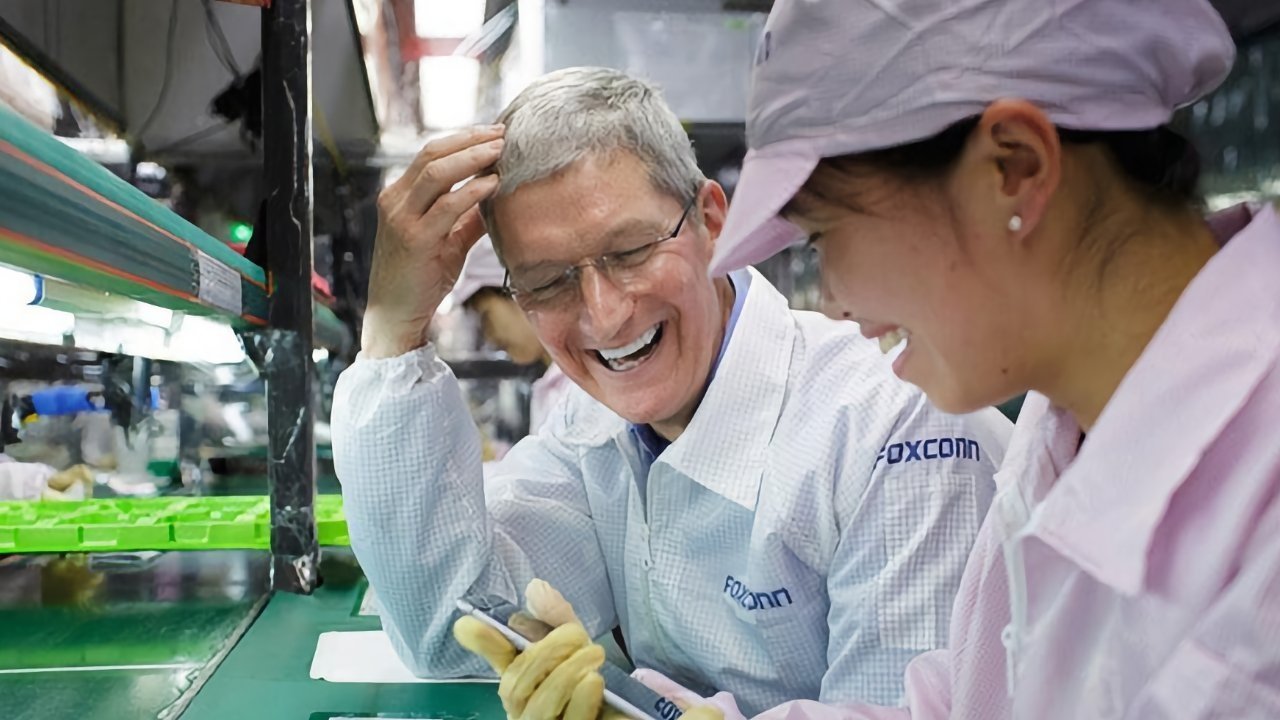Apple supplier Foxconn is falling behind in its decarbonization efforts, a Greenpeace report asserts, with the supply chain partner producing the highest level of emissions of final assembly companies.
Apple has committed to reaching total carbon neutrality across all business areas by 2030, which includes everything from sales and use of devices like iPhones to the initial production. In Greenpeace's report released on Tuesday, it seems that there's still a lot of work to be done on the supply chain.
Greenpeace's 2023 Supply Change report assessed the decarbonization efforts of 11 major suppliers working with major brands, like Apple. For some, including Samsung and iPhone assembly partner Foxconn, they have "taken insufficient steps to reduce their emissions."
"Tech companies boast a lot about going green, but when you look at the bigger picture, you see that their supply chains are extremely dirty," said climate and energy campaigner Xueying Wu. "Climate action by Samsung Electronics and Foxconn has been remarkably weak"
The environmental organization claims the emissions from five of the biggest manufacturers, including Foxconn, TSMC, and Luxshare Precision, increased in 2022 versus 2020 figures. For these companies, it was put down to an increase in production across the board.
The 11 energy suppliers also consumed more than 111,000GWh of electricity in 2022, which is claimed to be more than Chile's annual electricity consumption.
In the rankings, Foxconn was the second worst-performing of firms deemed to be performing "Final Assembly," with a D+ rating in 2022 equalling that of 2021. It was better than Goertek which scored F in both years, but did worse than Pegatron's improvement from D- to C, and Luxshare's change from D+ to C+.
Foxconn "showed little progress on emissions reduction and renewable energy adoption compared to its rival, Luxshare," the report reads. It's asserted that Foxconn's renewable electricity usage rate in 2022 was just 8%.
Only four of the suppliers in the list pledged to achieve net zero emissions across chains by 2050, with Foxconn, Luxshare, and TSMC in that group. However, Greenpeace believes they "lack targets to reduce emissions by more than 50% by 2030, which means that their 2030 emissions reduction targets are not in line with the 1.5C Paris Agreement goal."
In April, Foxconn announced environmental initiatives and an aim to reduce emissions in 2025 by 21% of levels observed in 2020.
Many suppliers were found to rely "heavily" on low-impact procurement mechanisms like RECs to improve their renewable electricity procurement ratio. Luxshare, Pegatron, and Foxconn all sourced at least 70% using such methods, including onsite generation, investments in renewable energy, and Power Purchase Agreements.
While Foxconn didn't rate highly in most categories, it did manage to get an A+ in Transparency, with its disclosure of "complete environmental data," including energy usage, electricity, and emissions. Even so, it was rated an F for Advocacy, due to there being no publicly available information or direct disclosures of its work on "renewable energy-related policy advocacy and peer information sharing."
 Malcolm Owen
Malcolm Owen







-m.jpg)





 Bon Adamson
Bon Adamson
 Christine McKee
Christine McKee
 Amber Neely
Amber Neely
 Wesley Hilliard
Wesley Hilliard
 Marko Zivkovic
Marko Zivkovic

 William Gallagher
William Gallagher








6 Comments
Greenpeace needs to slam India and China for their milquetoast carbon-free energy plans. There are a lot of 2050 carbon neutral promises between the two, but it needs to be 15 to 20 years earlier. It is shameful, basically killing their own descendants type of action, for them to build new coal plants. That's absolutely disastrous.
That whole area from India to China and to Indonesia contains something like 4 billion people, with the majority of them dependent on Himalayan snow and glacier melt to feed rivers to power, feed their peoples and global warming is going increase the altitude of the snow line, exponentially decreasing how much steady flow of water is going to go down those rivers. In some cases, water won't even flow to the ocean. It'll be a trickle like the Colorado and Rio Grande
If they need a thermal plant, go nuclear. Solar+batteries is the way to go though. It only gets cheaper the more they build out. China, India, and southeast Asia going nuclear and renewables will go a very long way in making multiple market economies go carbon neutral.
Slamming China and India would solicit a “Talk to the hand” response. They can’t be shamed because they pretty much don’t care about anything Greenpeace has to say that paints them in a negative light.
Chinas cumulative carbon emissions, i.e total amount accumulated in atmosphere, is about 250 billion tonnes. The USA is about 500 billion tonnes.
Numbers are from sites like Carbon Brief, Our World Data etc.
Almost one quarter of all carbon in air up to date since industrialization is put out by USA.
Our World Data 2019:
" the United States has emitted more CO2 than any other country to date: at around 400 billion tonnes since 1751, it is responsible for 25% of historical emissions; this is twice more than China – "
The EU is about 300 billion tonnes.
India is about 50 billion tonnes.
Adjusted for population, USA has produced something like 9 times more carbon than China.
You can see the shocking charts (that contradict the common narrative blaming China etc) in Our World Data etc.
Some people then blame China India for their 'too big populations'. Then why doesn't USA compare itself to say Singapore with 7 million population or Brunei ?
Oh yeah forgot to add above it's the USA that has walked away or torn up several world climate accords. Basically the only country to do so.
Also since EU now has stopped cheap Russian gas it is now going back to oil, coal or thinking hard about it. Shipping LNG from USA by carbon burning ships isn't exactly carbon effective either.
“Greenpeace reports”. They lie all the time
ALL THE TIME. F Them